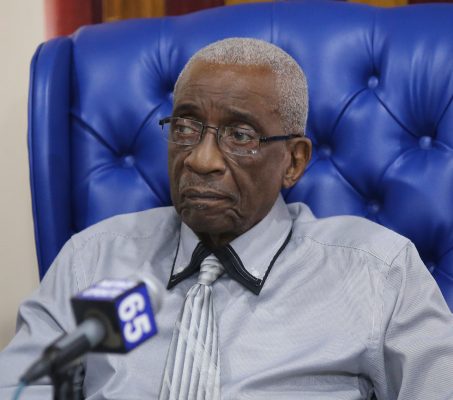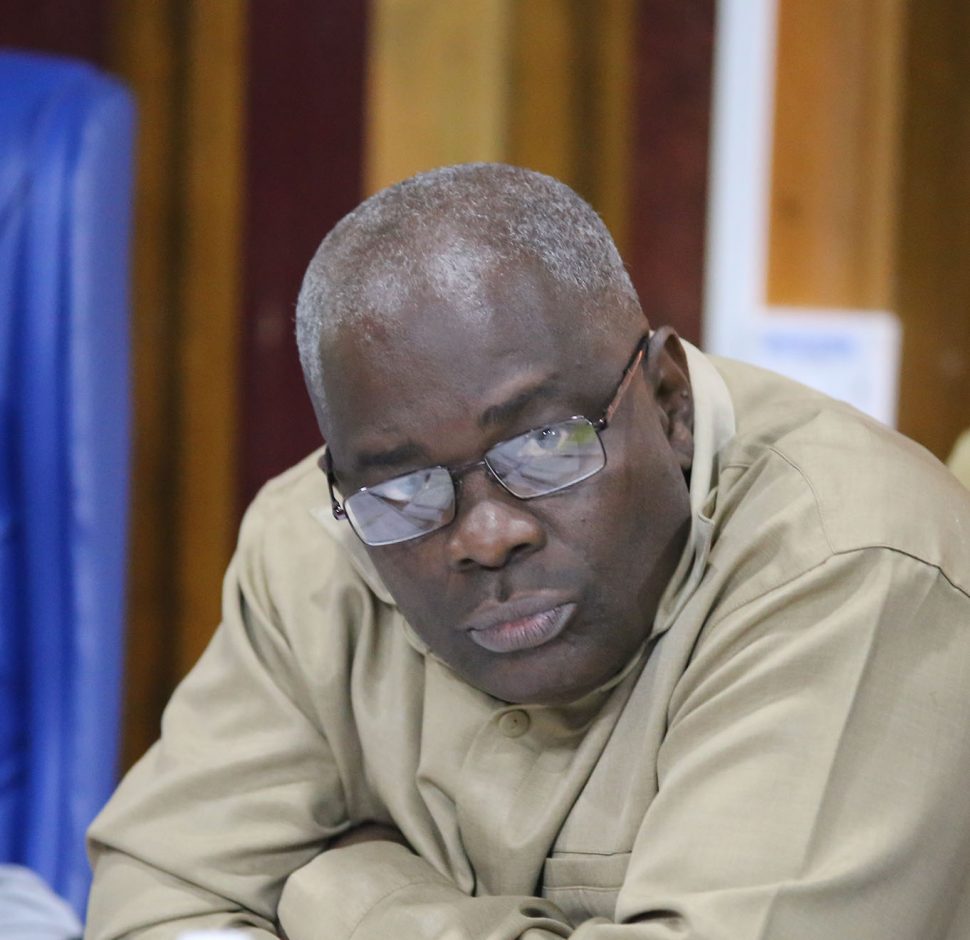Ruling out the holding of general elections by the constitutional deadline, Chief Election Officer (CEO) Keith Lowenfield maintained yesterday that July is the soonest that general elections can be held once the Guyana Elections Commission (GECOM) gives the approval for the start of preparations.
However, Lowenfield was at pains to point out at a press conference yesterday that although he has repeatedly asked the seven-member Commis-sion for permission for the Secretariat to go into “operations mode,” this has not been forthcoming.
“Today is the 8th [of February]. You haven’t said anything to me yet. If you communicate to me, I move,” Lowenfield noted, before adding that if the Secretariat was permitted to begin work on Monday it would be ready for elections in 148 days.

The opposition PPP/C has been calling for GECOM to begin poll preparations for the holding of elections by March 21st, which would mark three months since the passage of a no-confidence motion against the APNU+AFC government in the National Assembly. According to Articles 106(6) and 106(7) of the Constitution, the Cabinet, including the President, shall resign if the government is defeated by the vote of a majority of all the elected members of the National Assembly on a vote of confidence and elections are to be held within three months unless a two-thirds majority of the House grants an extension. Government has mounted a legal challenge to the validity of the passage of the motion and is currently appealing judgements by Chief Justice Roxane George-Wiltshire, who upheld it last week.
Notwithstanding the appeal, the opposition has called for GECOM to begin preparations for elections and accused government of influencing the constitutional body to drag its feet on the process.
With a decision still to be made on the way forward, the government and opposition-nominated commissioners yesterday appeared to be trading blame on how and by whom permission should be granted to the Secretariat to begin preparations.
Retired judge James Patterson, who chairs the Commission, was emphatic that he cannot grant permission and could only advise that it be offered.
“I am Chairman of a Commission; I can’t initiate and have implemented policy,” Patterson told reporters before adding that depending on the circumstances, the other commissioners may listen to his wisdom or they may not.
Opposition-nominated commissioner Sase Gunraj is certain that this permission has already been granted “by consensus,” since no one objected when Lowenfield requested the go-ahead at a meeting on Tuesday.
“The Secretariat does require a mandate from the Commission to proceed,” he told reporters at a separate press conference before adding that “conditionally, there are some things that the Secretariat does as a matter of course that does not require input from the Commission.”
“I was under the impression that on Tuesday last we gave the go-ahead. The mandate was given by consensus of all commissioners present as well as the Chairman,” Gunraj said.
APNU+AFC-nominated commissioner Desmond Trotman, however, disagreed. According to Trotman, “the CEO has been harnessed by commissioners who felt in the past he should not have leeway to do certain things.”
“In harnessing him, they threatened him on several occasions and he was told that everything he does must be sanctioned by the commission. When he was functioning on his own, he was told if he wanted to purchase a lead pencil, he must come to commission for permission,” Trotman detailed before adding that “the commission has not lifted the harness from off him.”
Asked if he was prepared to lift the harness from Lowenfield, Trotman argued that this must be done by “the persons who sought to harness him,” that is the opposition-nominated commissioners.
Asked if the CEO can at least count on his vote the next time he approaches the commission for permission to act, Trotman said, “When that matter comes up for discussion, a decision will be made.”
He added, “The matter has to be put to the full Commission, not to Desmond Trotman.”
Staff training
Meanwhile, Lowenfield told reporters that one of the activities he needs permission for is the training of polling day staff, which is likely to take a minimum of 105 days and should conclude at least 21 days before elections day. Other timelines, including procurement of sensitive material such as ink and the printing of ballot papers, also affect the timeframe within which the Secretariat can be ready, though they can run concurrently, he noted. The printing of ballots specifically is expected to take 18 days.
“Even if I utilise 20 training teams at schools across the spectrum of Guyana, it will see us taking a minimum of seven to nine weeks to ensure we train in all regions,” Lowenfield stressed.
He used Region Three, which has in excess of 300 polling stations, requiring approximately 1,500 polling day staff, to illustrate the situation.
“If I start from Parika, with 20 teams operating on weekends and all things being equal, that is, I have the turnout of participants, then one weekend training will [take care of] Region Three. If I take East Coast and East Bank, which have 318 and 182 polling stations [respectively]… that is a weekend plus,” Lowenfield noted, before adding that extra sessions have to be scheduled for a “second pass” or any “mop up” which might be necessary to ensure the required complement of staff is at every location.
“I cannot run an election in part of Guyana… When I hear suggestions that we can train all of Guyana in 29 and 32 days it stultifies my own thinking,” he stressed before noting that ideally the staff must be from the communities in which they are working
The CEO added that while staff trained for Local Government Elections can be re-used, they must undergo refresher training and this cannot happen during the week as suggested since the majority of trainers are teachers. “My training arrangement must be in place on or before the 21 days before election because the law states that notices of poll must be issued at that time,” he further explained.
Opposition-nominated commissioner Robeson Benn, however, challenged Lowenfield’s timelines.
According to Benn, the timelines are heavily padded. He noted that the Secretariat’s first submission to commissioners pegged training as requiring 90 days but now that period has been extended to 105 days, while Nomination Day has been pegged at 55 days before elections.
He maintains that special leave can be granted to those teachers involved in the process to facilitate a 32-day training period.
Deputy Chief Election Officer, Roxanne Myers, in supporting Lowenfield’s position, stated that based on statutory requirements, Nomination Day would have had to have been by the end of January if elections were to be held in March, while Public Relations Officer Yolanda Ward said that the timeline prepared has identified 148 days as the time necessary for all preparations to be completed. Nomination Day should, based on statute, be at least 32 days before elections.
Lowenfield stressed that he had provided these timelines to the commissioners on January 22nd and February 4th and requested on each occasion that they grant approval for the Secretariat to go into operations mode but they did not acquiesce.
He acknowledged that if elections were to be held in July, the current voters’ list would have expired and, therefore, a new list would have to be generated.
According to Myers, the current list, which expires on April 30th, can be used as a preliminary list to facilitate a claims and objections period to add newly eligible voters and remove those who have died.
Asked about a timeframe for house-to-house registration, which the governing APNU+AFC coalition is insisting on, Meyers noted that such an exercise is likely to take nine months.






